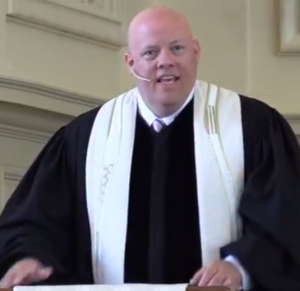A MESSAGE FROM THE REV. J.C. AUSTIN: THE PRACTICE OF INTENTIONAL JOY
Advent has become an increasingly unusual season in the Christian church because it stands in significant contrast to the way in which the general culture prepares for Christmas. In terms of our theology and worship, Advent is not simply intended to be a “tailgate party” for Christmas, gathering together to wait for the big game with increasing amounts of fun and festivity.
Rather, Advent is intended to be a time of anticipation  and active preparation for the coming of Christ, recognizing that the world is not how God intends it to be, and claiming the hope that, in Jesus Christ, God has established the reign of God on Earth and will bring it to full fruition at the end of time. In fact, for many centuries Advent was a season of individual fasting and prayer as part of that preparation, like Lent, which is part of why the color of Advent is purple, just like Lent.
and active preparation for the coming of Christ, recognizing that the world is not how God intends it to be, and claiming the hope that, in Jesus Christ, God has established the reign of God on Earth and will bring it to full fruition at the end of time. In fact, for many centuries Advent was a season of individual fasting and prayer as part of that preparation, like Lent, which is part of why the color of Advent is purple, just like Lent.
That’s also why this third week of Advent is unusual even within the season of Advent. You’ve probably noticed that one of the candles on the Advent wreath is pink, not purple; that is the candle we will light this week, the third week of Advent, which has the theme of Joy.
Advent is no longer observed by Presbyterians as a penitential season, but it retains a sense of thoughtful and prayerful introspection and preparation. But when Advent really was a season of penance, the ecumenical church realized that joy is an essential part of anticipating the coming of Christ, but it was being obscured by the somberness of the Advent season. So they established Gaudete Sunday as the third Sunday of Advent. “Gaudete” is Latin for “Rejoice,” and it was chosen as the theme of the third Sunday of Advent to emphasize that Christians can and do rejoice as the coming of Christ draws near.
Each of the themes associated with a Sunday in Advent has its own power, and you could make a case for each of them as being the most important one: Hope, Peace, Joy, and Love. But I think it’s interesting that we have to be particularly intentional about making space for Joy in our Advent observances.
Perhaps that’s because, of the four of them, Joy is the only one that is its own reward. Hope prevents despair; peace ends unproductive conflict and creates wholeness and well-being; love establishes right relationships between God and our neighbors. But joy… creates joy!
But that is perhaps why it is so important to remember, because joy keeps our faith from becoming one of obligation and even drudgery; it reminds us that receiving God’s grace in Jesus Christ is not a forensic process but an experience that changes and defines our whole being, enabling us to express and live in joy even in difficult circumstances, because God is with us and will not be moved.
So in preparation for worship this Sunday, I invite you to spend a few minutes considering where you have experienced or encountered joy in your life recently. Where have you been filled with delight? What prompted it? And how can you share that with others?
This practice of intentional joy is just as important to a true season of Advent as acts of love, building up peace, or signs of hope. And the more attentive we are to it, the more reasons we will find for rejoicing. So with that promise in mind, I look forward to worshipping with you in joy this Sunday!
And let us all continue to pray for the coming of Christ as we claim God’s blessings of hope, peace, joy, and love in this season of Advent.
Grace and peace,
J.C.
